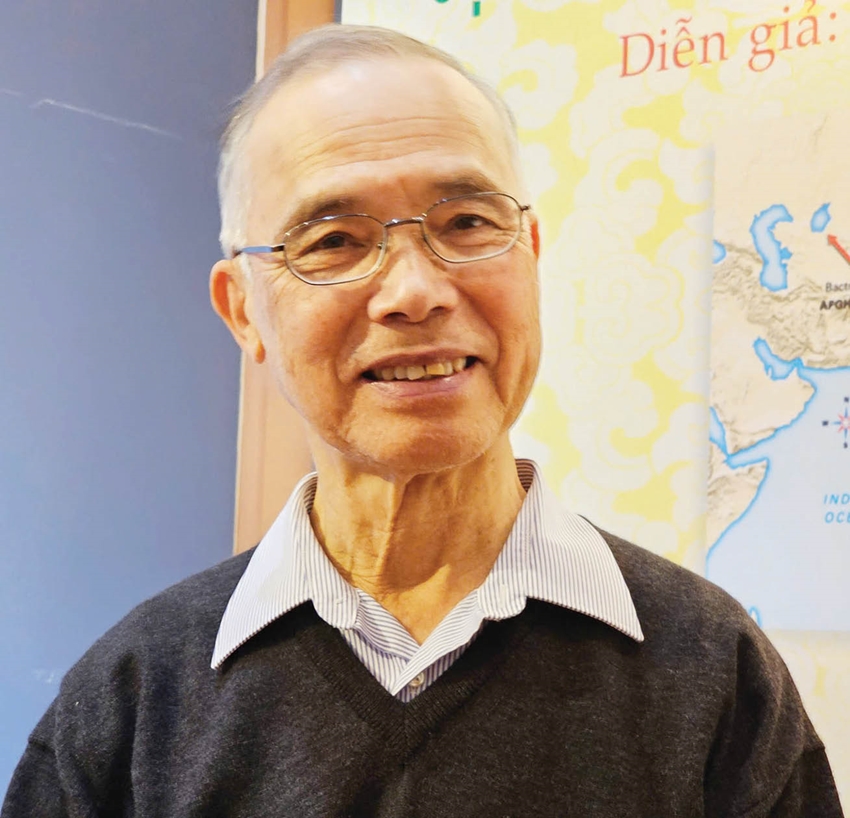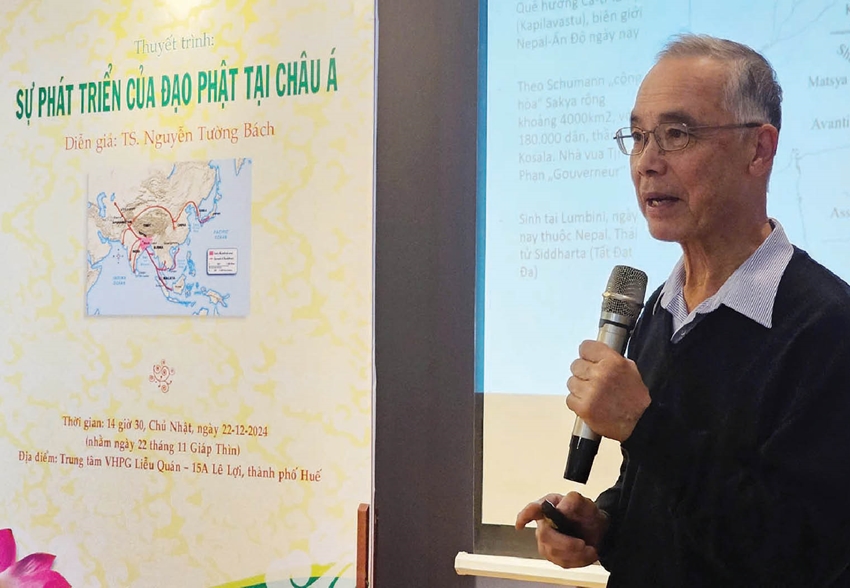 |
| Dr. Nguyen Tuong Bach |
Having just returned to Germany after a series of days of repatriation with a lot of events presenting about Buddhism, talking and launching books with Vietnamese readers - as a chance, Dr. Nguyen Tuong Bach gave Hue Today Weekend a conversation revolving around his passion for studying Buddhism that he has pursued for decades.
Dr. Bach confided: “At the age of 40, I was fortunate to visit Buddhist holy sites where Buddha lived and preached. I had more opportunities to study scriptures and contemplate my own consciousness as well as my life circumstances. Those good fortunes created the person I am today.”
A monk who attended his lecture in Hue at the end of last year exclaimed: “Why does Dr. Bach spend so much time researching and understanding Buddhism?” Perhaps this is also what many people are curious to ask him?
The teachings of the Buddha in the scriptures are actually descriptions of our own minds and the steps necessary to reach the right understanding. I realize that the content of the scriptures is our own life and mind. Therefore, I am interested in contemplating myself, in contemplating the workings of my own mind. I often tell myself that my mind is “a scripture without words”. Because of that interest, I often turn my gaze inward and explore myself . Studying and understanding Buddhism for me is a journey of turning my mind inward and so it happens to me frequently.
 |
| Dr. Nguyen Tuong Bach on a visit to Vietnam and gave a presentation on Buddhism in Hue |
In his journey of studying Buddhism, he traveled to many regions of the world and more or less of those trips were recounted in his published works. Behind the journey and the pages of the books, there must have been many difficulties?
Long trips, especially to religious relics, are often not as comfortable as vacations. Waking up early, sleeping little, walking a lot, sometimes the sun is harsh, sometimes it is freezing cold. Sometimes we have to endure confusion, confusion, and getting lost. In addition, pilgrims also have to carefully study scriptures, documents, and information, need time to interact and talk, sometimes it is very tiring, it requires effort. However, religious faith and the excitement of following in the footsteps of Buddha and Bodhisattvas are extremely strong motivations that help us overcome all hardships. From a document I learned that the more difficult the pilgrimage path is, the greater the merit.
And which land impressed you the most on that journey?
Of course, India, where the historical Buddha was born and attained enlightenment nearly 2,600 years ago, is the place that left the deepest impression. The northeastern region of India, now part of the state of Bihar, is known as the “sacred land” of this country, the origin of many spiritual sources, including Buddhism. The Buddha lived and preached here, leaving behind the most important relics. Coming here, we feel the greatness of the Buddha and deeply feel his teachings.
Sir, what is the most memorable memory you have on your journey to lands related to and influenced by Buddhism?
Besides India, my trips to China, known as the land of Bodhisattvas, or Tibet - the “roof of the world”, brought me a lot of inspiration and awareness about Buddhism. Those places are the origin of Buddhism that developed after India, are extremely unique, and have had a lot of influence on Vietnamese Buddhism.
Many people are curious about how he manages his time for such trips?
When I was still working as an employee for a foreign company, I often combined business trips with my personal life. If I was skillful, I could do it. Later, when I became more in control of my time, it was just a matter of what to prioritize. Actually, arranging time to do something is an internal decision, whether we are determined or not. In addition, careful preparation of the itinerary and organization also helps us save time. But in general, time management is actually an internal arrangement, requiring concentration and knowing clearly one's purpose.
Do you feel that this amount of time traveling through Buddhist lands is enough? And what else makes you wonder in your journey of studying Buddhism?
I have been to many foreign lands such as India, China, Tibet, but it is never enough to say enough because in reality, there are many enlightened people who have lived everywhere. In Japan, Korea or Vietnam, even in Germany, France or America, there are footprints of extraordinary people who we can say are enlightened. However, with the same landscape, with the same people, whether the visitor can recognize it or not depends on the visitor's level of perception. So the problem is that we need to have a mature, experienced inner self to "see" the extraordinary things in the landscape.
Now, after decades away from home and pursuing many jobs, including studying Buddhism, which role do you think you are most suited to?
I see myself as both a student and a teacher. I enjoy being a teacher.
A personal question, as a Buddhist researcher, have you ever felt stuck in both your research and your life?
As a Buddhist, I am imbued with the theory of Dependent Origination to see things, to explain something when it appears. Therefore, I can quickly understand why a situation, a thing is formed. But understanding is one thing, resolving conflicts is another. Therefore, I often feel stuck, helpless in many situations. In fact, there are many things that I feel useless, unable to do anything.
If you encountered such a situation, how did you find a way to balance and resolve it?
In such cases, we mostly just keep quiet and give up. Sometimes it also gives us more opportunities to reflect on our consciousness and on life.
And what would Buddhism in your mind, if explained as briefly as possible, be like?
| Dr. Nguyen Tuong Bach was born in 1948 in Hue, went to Germany to study in 1967 and currently lives there. Not only is he a physicist, he is also the author and translator of many books loved by readers such as: The scent of incense, Who weaved the sky's net, Last night in the front yard, a mai branch, A dream of a life that never ends... |
In short, Buddhism is a system of perception about human beings, about human consciousness, about nature and the universe. In addition, Buddhism gives us some methods to liberate people from the suffering that everyone has. It is an extremely noble system of perception and action, but the true spirit of Buddhism is not easy to understand for the majority of people. It takes a lot of luck to understand the essence of Buddhism, a lot of luck to encounter Buddhism in life.
After a rich life, what is the most important thing you have learned?
My most important lesson is to know how to look inside. People often look outside, perceive, judge outsiders and act according to that perception. If they see something suitable, they praise it, if they see something different, they criticize it. All conflicts and resentments start from there. If we know how to turn our gaze inside, we will discover the activities of our mind, clearly know everything that our mind creates. That is the first step on the path to enlightenment. The Buddha also taught that.
Thank you Dr. Nguyen Tuong Bach for the interesting conversation at the beginning of the year of the Snake!
Source: https://huengaynay.vn/van-hoa-nghe-thuat/ts-nguyen-tuong-bach-phai-biet-nhin-vao-ben-trong-151004.html




















































![[Maritime News] More than 80% of global container shipping capacity is in the hands of MSC and major shipping alliances](https://vphoto.vietnam.vn/thumb/402x226/vietnam/resource/IMAGE/2025/7/16/6b4d586c984b4cbf8c5680352b9eaeb0)












































Comment (0)